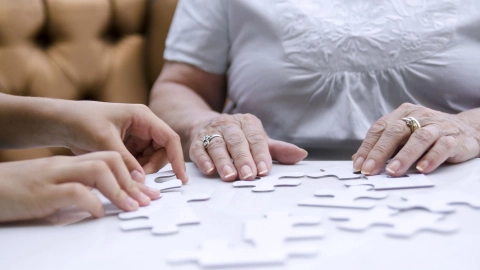Conditions Alzheimer’s disease
ICD codes: F00 G30 What are ICD codes?
People with Alzheimer’s disease suffer a progressive deterioration of their memory, speech and language abilities and orientation. It becomes increasingly difficult for them to manage independently and they need more and more support as time goes by. There are treatments that influence the progression of Alzheimer’s disease. However, there is no cure.
At a glance
- With Alzheimer’s disease, increasing numbers of brain cells die as the disease progresses, leading to cognitive impairment.
- The risk of developing Alzheimer’s disease increases with age.
- There is as yet no known treatment to cure or halt the progression of this disease.
- However, there are medications and non-pharmaceutical treatments that aim to improve quality of life.
- Many people with Alzheimer’s receive support and understanding if they are frank and open about their disease.
Note: The information in this article cannot and should not replace a medical consultation and must not be used for self-diagnosis or treatment.

What is Alzheimer’s disease?
Alzheimer’s disease – also known as Alzheimer’s dementia or simply Alzheimer’s – is the most commonly occurring form of dementia. Dementia involves a progressive loss of important brain functions. Memory and concentration are usually affected first. People with dementia find it increasingly difficult to cope and to lead an independent life.
Video What is dementia?
This video explains what causes dementia and how it can be treated.
This and other videos can also be found on YouTube
Watch nowThe privacy policy indicated there applies.
What symptoms occur with Alzheimer’s disease?
Most people experience a deterioration in memory and learning ability as part of the aging process. It is normal for older people to find it more difficult to adjust to new circumstances and situations. However, the capacity to access acquired knowledge is retained. Normally, older people are still oriented (i.e., aware of time and place), independent and capable of making their own decisions and judgments.
This is not the case if a person has Alzheimer’s disease, as their cognitive functioning deteriorates progressively over time. The first sign is usually impaired short-term memory – those affected forget what has just happened but can still recall events that occurred in the distant past. Over time, long-term memory also becomes impaired. People with Alzheimer’s also find it increasingly difficult to find the right words to say and to remember the meaning of terms.
Many show changes in their behavior and personality at some stage, becoming more anxious, timid, passive, distrustful or even aggressive.
What cause Alzheimer’s disease?
The precise causes of Alzheimer’s disease remain largely unknown. It is very likely that multiple causes are at play in its development. As the disease progresses, increasing numbers of brain cells die. However, it is not yet understood exactly why this happens. Research has determined that the brains of people with the disease are deficient in acetylcholine – an important neurotransmitter.
It has also been discovered that small proteins are deposited in the brains of people with Alzheimer’s disease. These deposits may be the reason for increasing brain cell death.
Which factors increase the likelihood of developing Alzheimer’s disease?
The likelihood of developing Alzheimer’s disease increases with age – from around age 65, more people are affected by the condition. Many studies have investigated a possible link between certain other diseases, behaviors, and lifestyle factors and the risk of developing dementia. While research has yet to produce any clear answers, it does indicate that the following factors may affect the development of Alzheimer’s disease:
- diabetes mellitus (diabetes)
- elevated cholesterol
- smoking
- depression
- high blood pressure (hypertension)
- being overweight/obese
- lack of social contact
- impaired hearing
- low level of education
Heredity also plays a role. To date, a small number of genes have been identified that increase the risk of developing Alzheimer’s disease. In some families, for example, Alzheimer’s disease can affect multiple family members from middle age. Special genetic testing can determine whether an individual has this type of pre-senile Alzheimer’s disease. If they do, their siblings and children are at an increased risk of developing the disease.
How many people have dementia?
There are around 1.6 million people with dementia in Germany, with over two-thirds of these having Alzheimer’s disease.
Dementia is more common in women than in men. The main reason for this is their longer life expectancy. After all, most cases of the disease begin at an advanced age. In the 65 to 69 age group, the disease affects more than 1 percent of people, while this figure rises to around 10 percent in the 80 to 84 cohort.
How does Alzheimer’s disease progress?
Alzheimer’s disease is a chronic disease that becomes progressively worse over several years. Most people are aged over 65 when the first symptoms appear.
Early stage
- People with early-stage dementia find it increasingly difficult to live a completely independent life.
- They become forgetful and have difficulty concentrating.
- More complex daily tasks may present a major challenge.
- Increasing forgetfulness may lead to feelings of anxiety, stress, aggression, and shame.
- Some people with Alzheimer’s experience depression and are frequently irritable.
Middle stage
- People with middle-stage Alzheimer’s are no longer able to lead an independent life.
- While they can still feed themselves, take care of their own personal hygiene and complete simple household tasks, they need to be reminded to do so.
- More complex tasks, such as shopping, cooking, cleaning or going for a walk, are only possible with support from others.
- Overall, individuals in this stage of the disease are at an increased risk of getting lost and being unable to find their way home and of causing harm to themselves or others by forgetting to switch off appliances like the oven or iron.
- Their day/night (sleep/wake) cycle is frequently also disturbed.
- Speech comprehension and production is impaired.
- Individuals find it increasingly difficult to distinguish between the past and present.
Late stage
- Continuous support from others is needed during this stage of the disease.
- Difficulties with speech and comprehension may be so severe that conversation becomes virtually impossible.
- The simplest of tasks can no longer be completed independently. Assistance with eating and drinking is required.
- Often, people in an advanced stage of dementia no longer recognize those closest to them. They are frequently fretful, experience hallucinations, or confuse past and present events.
- Control of bodily functions may also be lost.
How is Alzheimer’s disease diagnosed?
Alzheimer’s disease cannot be detected with certainty using the tests and screening procedures currently available – such as computed tomography (CT) of the brain or special laboratory blood tests.
Comprehensive diagnostics are therefore required to confirm or rule out a suspected case of dementia. The first point of contact is usually the family doctor. Further diagnosis often involves a multi-disciplinary team of specialists – primarily from the fields of neurology, psychiatry, and radiology.
A reliable diagnosis also requires that other diseases be considered as potential triggers of the symptoms presented. After all, symptoms such as increasing forgetfulness, orientation problems, and behavioral changes may have very different causes. Alzheimer’s disease can only be diagnosed if the symptoms have been present for more than six months and if other causes are unlikely.
How is Alzheimer’s disease treated?
People with Alzheimer’s disease require long-term treatment and support. Depending on their individual needs, specific life situation, and the stage of the disease, they may require a care team comprising specialists from the fields of medicine, psychology, nursing and social work.
The progression of Alzheimer’s disease can be positively influenced by means of various medications and other, non-pharmaceutical treatments. However, there is as yet no known treatment to cure or halt the progression of this disease.
Family support is usually a key component of care. Volunteers may provide additional support.
Treatment of Alzheimer’s aims to:
- preserve independence and the ability to cope with daily life for as long as possible
- alleviate psychological symptoms
- improve overall quality of life
- lighten the daily burden on relatives
Non-pharmaceutical treatment options include:
- memory and orientation exercises
- daily group activities
- art therapy, aroma therapy, animal therapy, music therapy
- physical activities
- massage
- training for relatives
For more information about non-pharmaceutical treatment of Alzheimer’s disease, see gesundheitsinformation.de.
The most common medications include:
- Cholinesterase inhibitors: These drugs seek to stimulate the exchange of information between nerve cells in order to alleviate symptoms of dementia.
- Memantine: This active agent aims to prevent an excess of glutamate from damaging the brain. It is suspected that in Alzheimer’s, glutamate builds up in the brain causing nerve cells to die.
- Extracts from the leaves of the Ginkgo tree, which aim to promote blood flow and protect nerve cells.
Important: Various types of medication are available that may slightly delay the loss of cognitive functions in people with mild to moderate dementia. These drugs may also have side-effects. It is unclear which medication is most effective in treating dementia.
For more information about medical treatments for Alzheimer’s disease, see gesundheitsinformation.de.
What is everyday life like for people with Alzheimer’s disease?
The experience of Alzheimer’s disease varies widely between individuals. Some manage to accept their disease and to lead an active, contented life for as long as possible. Others feel defeated, becoming depressed and increasingly withdrawn.
Yet others try to suppress their disease and its symptoms. However, many people have a positive experience if they are open and honest about their situation. This means that their family and partners in particular, but also their friends and acquaintances have an opportunity to offer support and provide assistance in many different ways.
These supports become increasingly important as dementia progresses and permanently changes daily life – both for those affected and for their loved ones. It becomes more difficult to participate in group activities and hobbies. There is a shift in roles and responsibilities. Conflicts within families and couples may increase. Care and nursing requirements can sometimes present such a major challenge to loved ones that they themselves need support.
Sharing experiences with other people (e.g., in a support group) is often valuable and beneficial. It is also important to remain as active as possible and to pursue hobbies like walking, crafting, cooking, or singing for as long as possible – many things can still be achieved with Alzheimer’s disease.
On gesundheitsinformation.de, some people with Alzheimer’s and their loved ones share their experiences.
Where can more information about Alzheimer’s disease be found?
People with Alzheimer’s disease increasingly lose their independence as the disease progresses. They increasingly need other people to help care for them. At some point, they will also lose the ability to make important decisions by themselves.
It is therefore important, in the early stages of the disease, to learn about what can be expected in the future and to make appropriate arrangements in advance.
Lasting power of attorney and guardianship directive
A lasting power of attorney (LPA) or guardianship directive can be used to determine who is to be responsible for care of the patient and for making decisions on the patient’s behalf later on. Specific conditions can also be stipulated, which must be met in order for the LPA to come into effect.
You can download the official form for Lasting Power of Attorney for Health and Welfare (“Vorsorgevollmacht” in German) from the website of the Federal Ministry of Justice and Consumer Protection.
Video What is a lasting power of attorney?
The following video explains the concept of a lasting power of attorney and how it is used.
This and other videos can also be found on YouTube
Watch nowThe privacy policy indicated there applies.
Advance healthcare directive (living will)
An advance healthcare directive, also known as a living will, allows people to specify whether and which life-sustaining measures are to be taken if they become severely ill in the future.
Video What is an advance healthcare directive?
The following video explains what an advance healthcare directive is and how it is used.
This and other videos can also be found on YouTube
Watch nowThe privacy policy indicated there applies.
Support for family caregivers
As dementia progresses, psychosocial support, nursing care, and the provision of relief for family carers become increasingly important. Local services may be able to help with the first step in getting the support that is needed, e.g., facilities providing day-time care or hourly care for people with Alzheimer’s, training courses in caring for those with the disease or discussion groups for relatives. The main caregiver is also entitled to request short-term respite care if they themselves become ill or need some time off.
The Federal Ministry for Family Affairs, Senior Citizens, Women and Youth offers extensive information, as well as the addresses of advice and support services on its dementia information portal “Wegweiser Demenz” (in German).
The website of the Federal Ministry of Health provides information about long-term care and respite care for family members in its online guide to long-term care (in German).
The website of the German Alzheimer Association provides helpful background information about the disease, as well as valuable information about self-help support.
- Alzheimer Europe. Dementia in Europe Yearbook 2019 – Estimating the prevalence of dementia in Europe. Alzheimer Europe: Luxembourg 2020.
- Ballard C, Gauthier S, Corbett A et al. Alzheimer's disease. Lancet. 2011 Mar 19;377(9770):1019-31. doi: 10.1016/S0140-6736(10)61349-9. Epub 2011 Mar 1. PMID: 21371747.
- Bunn F, Goodman C, Sworn Ket al. Psychosocial Factors That Shape Patient and Carer Experiences of Dementia Diagnosis and Treatment: A Systematic Review of Qualitative Studies. PLoS Med. 2012 Oct;9(10):e1001331. doi: 10.1371/journal.pmed.1001331. Epub 2012 Oct 30. PMID: 23118618; PMCID: PMC3484131.
- Deutsche Gesellschaft für Allgemeinmedizin und Familienmedizin (DEGAM). Demenz. DEGAM-Leitlinie. Band 12. omicron publishing: Düsseldorf 2008.
- Deutsche Gesellschaft für Psychiatrie und Psychotherapie, Psychosomatik und Nervenheilkunde (DGPPN) und Deutsche Gesellschaft für Neurologie (DGN) in Zusammenarbeit mit der Deutschen Alzheimer Gesellschaft e.V. – Selbsthilfe Demenz. Demenzen. S3-Leitlinie. AWMF-Registernummer 038-013. 01.2016.
- Finckh U. Genetische Faktoren bei Alzheimer-Demenz. Deutsches Ärzteblatt 2006; 103(15): A1010-A1016.
- Hirschman KB, Joyce CM, James BD et al. Do Alzheimer's disease patients want to participate in a treatment decision, and would their caregivers let them? Gerontologist. 2005 Jun;45(3):381-8. doi: 10.1093/geront/45.3.381. PMID: 15933278.
- Kane RL, Butler M, Fink Het al. Interventions To Prevent Age-Related Cognitive Decline, Mild Cognitive Impairment, and Clinical Alzheimer's-Type Dementia. AHRQ Comparative Effectiveness Reviews; Band 188. AHRQ: Rockville 2017.
- Ohman A, Josephsson S, Nygard L. Awareness through interaction in everyday occupations: experiences of people with Alzheimer's disease. Scand J Occup Ther. 2008 Mar;15(1):43-51. doi: 10.1080/11038120701441080. PMID: 17852957.
- Phinney A, Moody EM. Leisure Connections: Benefits and Challenges of Participating in a Social Recreation Group for People With Early Dementia. Activities, Adaptation & Aging 2011; 35(2): 111-130.
- Robert Koch-Institut (RKI). Altersdemenz. Gesundheitsberichterstattung des Bundes. Heft 28. 11.2005.
- Stechl E, Lammler G, Steinhagen-Thiessen E et al. Subjektive Wahrnehmung und Bewältigung der Demenz im Frühstadium - SUWADEM: Eine qualitative Interviewstudie mit Betroffenen und Angehörigen. Z Gerontol Geriatr. 2007 Apr;40(2):71-80. German. doi: 10.1007/s00391-007-0434-6. PMID: 17450406.
In cooperation with the Institute for Quality and Efficiency in Health Care (Institut für Qualität und Wirtschaftlichkeit im Gesundheitswesen – QWiG).
As at:





